Patricia LORENZ
Ridge View Residential College (RVRC)
Patricia documents her experience of teaching the course “RVN2002 Wild Asia: conservation matters”, a substantial portion of which includes an overseas field trip and outdoor learning. She examines whether true learning can take place in such conditions, covering the benefits and challenges of incorporating outdoor learning in Singapore or abroad as a substantive part of the curriculum.
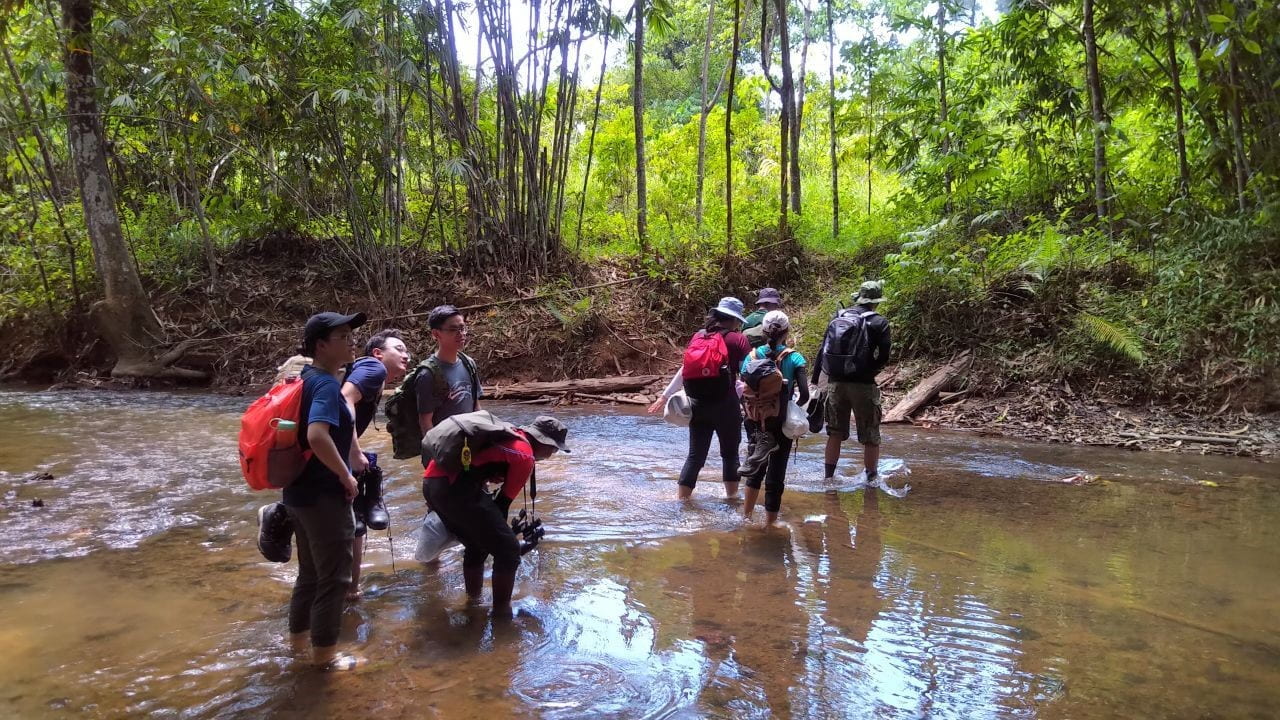
Crossing the river during a fieldtrip in the Sungai Yu Ecological Corridor. (Photo courtesy of the author)
Lorenz, P. (2024, March 27). Outdoor education: The power of throwing students into the deep end. Teaching Connections. https://blog.nus.edu.sg/teachingconnections/2024/03/26/outdoor-education-the-power-of-throwing-students-into-the-deep-end/
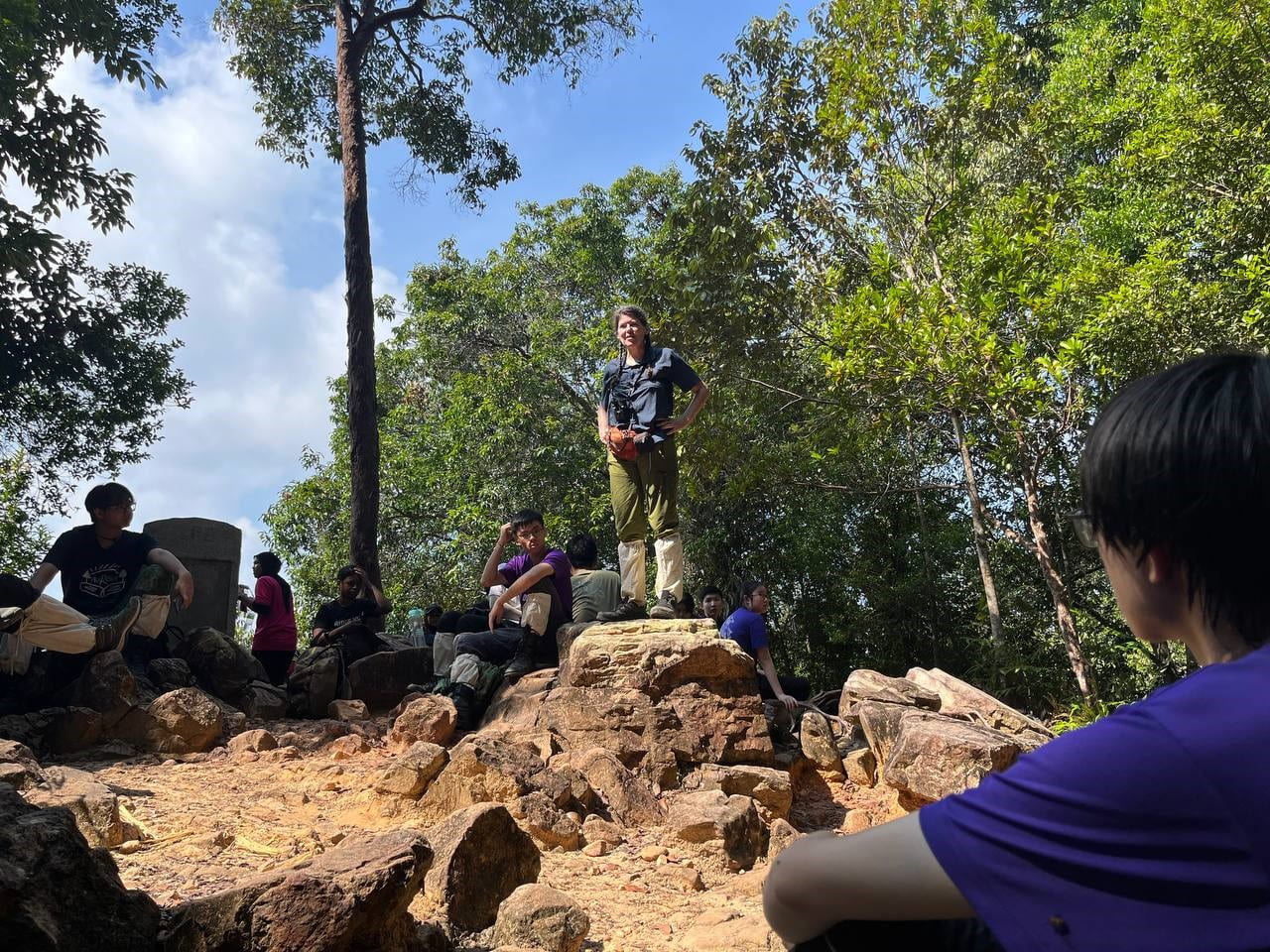
Figure 1. Conducting an outdoor classroom session during a trek to Teresek Hill in Taman Negara. (Photo courtesy of the author)
Outdoor learning facilitates a deeper learning experience by engaging students on a physical, emotional, and an intellectual level. By engaging all senses, students are able to process information at a much deeper level and consequently will be enabled to create complex connections (Jucker & von Au, 2022). It is one thing to read about the far-reaching consequences of deforestation in an article, but this is very different from seeing hundreds of trucks loaded with timber on the road, standing on the edge of a massive landslide, or walking through a degraded forest that has never recovered even 40 years after logging.
Yet, one might wonder whether such experiences warrant taking the risk of bringing students out of their comfort zones and throwing them into the deep end. RVN2002 “Wild Asia: conservation matters”, a course newly created under the NUS Southeast Asian Friendship Initiative (SFI) and offered to Ridge View Residential College (RVRC) students, is doing exactly that, and the first run in Special Term 1 of the Academic Year (AY) 2022/23 was a true success. As the title suggests, the course focuses on biodiversity loss, threats to the ecosystems, and conservation efforts within the Southeast Asian region, while examining the role of the indigenous Orang Asli and ecotourism in conservation areas (Figure 2). An additional aim of the course is to reconnect students with the natural world, as it has been proven that time spent in nature is extremely beneficial for physical and emotional wellbeing (Weir, 2020).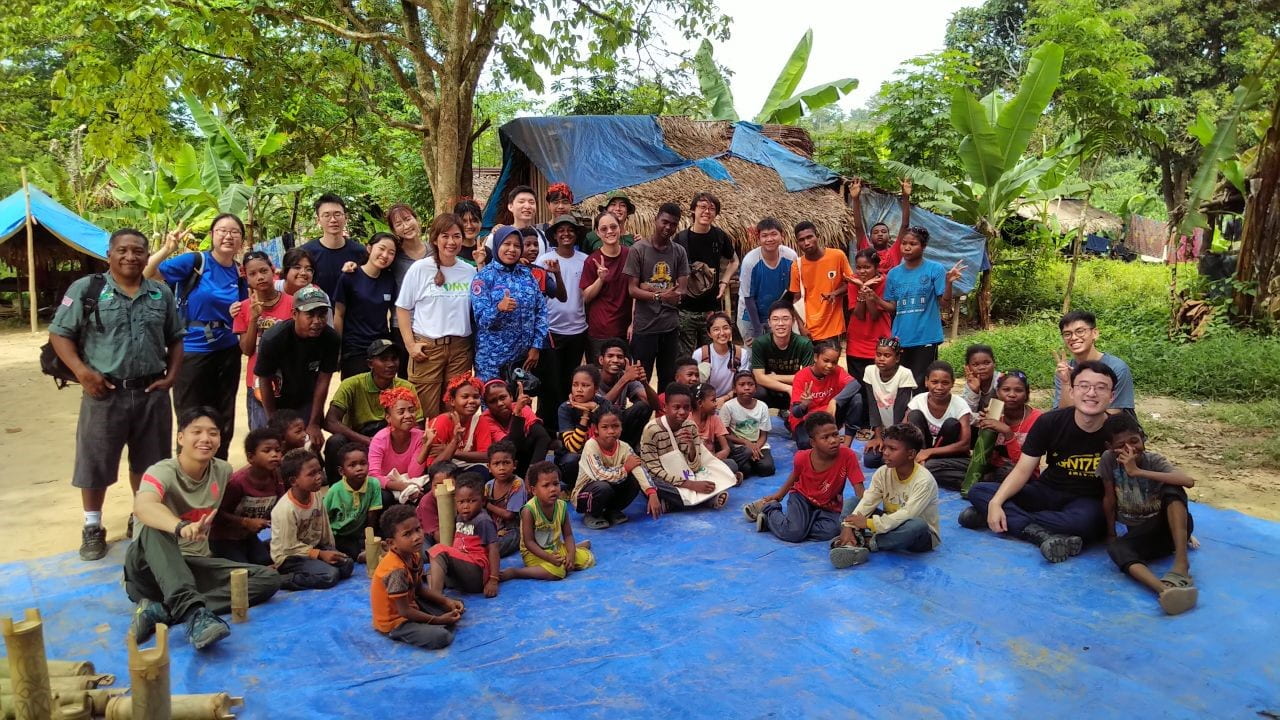
Figure 2. Group photo with Bateq children and members of ECOMY, who built a school in the remote Orang Asli village. (Photo courtesy of the author)
The course includes a 10-day overseas field trip, which continuously exposes students to the natural world through the exploration of forest trails in three ecologically significant areas of Pahang in Peninsular Malaysia; namely the Sungai Yu Ecological Corridor, Taman Negara, and Fraser’s Hill. Student activities include long treks during the day (Figure 3), night drives and night walks, boat rides to the Bateq villages, community interviews, and a forest bathing session. As such, students spent most of their time outdoors and engaged in activities they have never done before, in short, they were thrown into the deep end and needed to swim.
Figure 3. Crossing the river during a Cat Walk organised by MYCAT to deter poaching in the Sungai Yu Ecological Corridor. (Photo courtesy of the author)
This then begs the question, whether true learning can take place in such conditions? Avid outdoor educators such as RVRC Fellow Lim Cheng Puay (Lim, 2021), forest ecologist Dr Chua Siew Chin (Putting nature back in human nature: Exploring Asia’s environmental challenges, 2023), and Senior Lecturer N. Sivasothi (Why Singapore’s “Otterman” believes in learning beyond the classroom, 2023) will surely argue for the benefits of learning experiences outside the classroom, while others might highlight the risks involved, or might reason that outdoor education lacks academic rigour.
Yet, the benefits of unconventional outdoor learning (Figure 4) that takes students out of their comfort zone and into the jungle to experience the subject matter holistically is a notion that is supported by the students’ reflections on their personal learning journeys.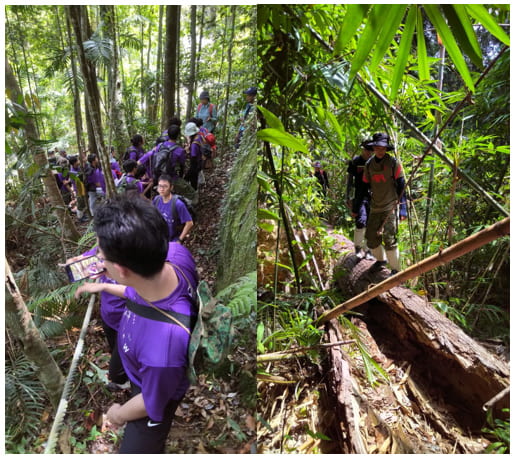
Figure 4. Experiencing unconventional outdoor learning; students gain confidence when navigating difficult terrain in Fraser’s Hill and Sungai Yu while learning about wildlife and nature conservation. (Photo courtesy of the author)
- Ngoi Kai Sheng [School of Computing (SOC)] describes the RVN2002 overseas field trip as an eye opening experience: “If any school trip I’ve had in my life was eye-opening, it has to be this.”
- Arya Muthukumar [Bachelor of Landscape Architecture (BLA), College of Design and Engineering (CDE)] describes how she learnt through the challenges: “At first, being thrown into the jungle on our first trek was mostly nerve-wracking, as I found it scary not knowing what I was walking into and not knowing what was out there. But with every trek that we went on, I became more comfortable and felt safer in the forest; starting to notice the beauty in nature.”
- Jordan Yeo (Advanced Robotics Center, CDE) echoes similar feelings: “For the first time, I wasn’t afraid of Nature. I was seeking and trying to understand it.”
- For Kiwi Lin Qiyu (Faculty of Science), the experiences of the overseas field trip changed her perspective: “The personal aspect of this experience made me more appreciative of our forests and more concerned/alarmed at the destructions that our forests are facing. With the changed perspective, I begin to reflect on our own actions and tried to be aware of what we are doing”.
- Ultimately, Niik Seah (SOC) summarises that “there’s a wealth of knowledge and experiences outside of the classroom that cannot be replicated. Seeing wildlife in real life, as well as mankind’s effect on biodiversity, and its consequences, is more impactful in real life.”
The deeper learning experience that took place through the outdoor education experience is also reflected in the students’ final video projects, in the form of educational mini-documentaries that each team had to create. These three video projects illustrate the students’ deep understanding of the subject matter and their ability to turn their gained insights into educational messages:
Additional video projects can be found in the RVN2002 YouTube channel.
Through the intensive outdoor learning approach, students have been deeply immersed in the subject matter, resulting in noticeable changes of confidence levels and perspectives during the fieldtrip. Students demonstrated profound understanding and critical evaluation in their reflections, as well as in their final fieldtrip projects, meeting the course’ intended learning outcomes. Students not only demonstrated having a deeper learning experience in the field of conservation, but there was also a noticeable shift in understanding and appreciation for indigenous communities and social issues. Setting aside time for outdoor learning sessions or incorporating extensive outdoor learning fieldtrips into an academic course requires modifications and adaptations, and might imply the reduction of theoretical content. Yet, the essential theoretical concepts taught in class are emphasised and put into context through experiential learning and the engagement of all senses. Drawing complex connections between the learnt theory and the real world enables learners to see different perspectives and facilitates a deeper learning experience. As such, investing extensive educational time in hands-on outdoor learning experiences are a beneficial value-add to academic courses.
References
Jucker, R., von Au, J. (2022, July 31). Outdoor Learning – Why It Should Be High up on the Agenda of Every Educator. In: Jucker, R., von Au, J. (eds) High-Quality Outdoor Learning. Springer, Cham. https://doi.org/10.1007/978-3-031-04108-2_1
Lim, C. P. (2021, January 20). Connecting Students with Nature: Conducting Outdoor Lessons the COVID-19 Way. NUS Teaching Connections. https://blog.nus.edu.sg/teachingconnections/2021/01/20/connecting-students-with-nature-conducting-outdoor-lessons-the-covid-19-way/
Putting nature back in human nature: Exploring Asia’s environmental challenges. (2023, March 2). NUS News. https://news.nus.edu.sg/putting-nature-back-in-human-nature-exploring-asias-environmental-challenges/
Why Singapore’s “Otterman” believes in learning beyond the classroom. (2022, December 21). NUS News. https://news.nus.edu.sg/why-singapores-otterman-believes-in-learning-beyond-the-classroom/
Weir, K. (2020). Nurtured by nature. Monitor on Psychology, 51(3), 50. https://www.apa.org/monitor/2020/04/nurtured-nature
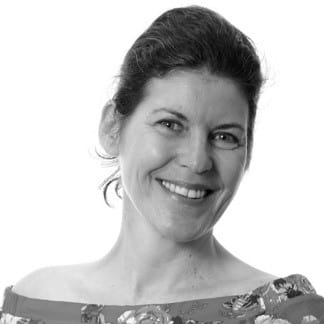 |
Patricia LORENZ is a Senior Lecturer at Ridge View Residential College (RVRC). She is a passionate outdoor educator in the field of Sustainability. Patricia is a passionate naturalist and loves the outdoors, travelling, and trekking. She volunteered for a year in Watarrka National Park in Central Australia and is an active member of the Nature Society Singapore (NSS). Patricia can be contacted at plorenz@nus.edu.sg. |

